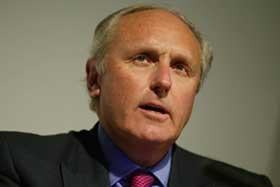
Daily Mail editor Paul Dacre has said that newspapers are better behaved now than at any time in his 45-year journalistic career.
He makes the assertion in the introduction to a new edition of the Editors’ Codebook, a free guide which helps editors to interpret the Editors’ Code.
The book uses the 500-odd decisions issued by the Independent Press Standards Organisation to explain how editors and journalists can avoid falling foul of the regulator.
Dacre, who is stepping down after eight years as chairman of the Editors’ Code Committee, has written the introduction to the new Codebook.
In it he said: “Despite their challenging financial plight, it is my profound belief that newspapers and magazines behave more responsibly today than at any time in my 45-year journalistic career.
“And yet, for too many politicians, employees of the subsidy-cushioned media, and so-called ‘academic journalists’ the mainstream British Press can do no good. This is both regrettable and dangerous.
“We should be proud of the industry’s countless magnificent campaigns that fight for the voiceless. We should be proud of the brilliant investigations that hold power to account.
“And we should be proud of the fact that we are the country’s only genuinely independent media – an independence that enables us to give expression to the concerns of ordinary voters throughout Britain, concerns that are too often ignored or censored by both the political classes and supposedly liberal media, sealed, as they are, in their metropolitan echo chamber.
“Is it too much to hope that we, as an industry, can now start making a virtue of this independence and proclaim the vital contributions we make to preserving a healthy democratic society?
“At the time of writing, our industry is locked in a battle to prevent the imposition of profoundly illiberal legislation designed to blackmail newspapers into subscribing to a system of regulation that is sanctioned by the state. Make no mistake, if this were to happen, it would be the beginning of the end of a free Press in Britain.
“As IPSO’s Chairman, Sir Alan Moses, eloquently put it: ‘The essence of our Press is that it cannot and should not be forced into doing anything it does not choose to do… if it acts under compulsion it is indeed doomed.’
“And it is the subject of independence which brings me back to the Code. It is our code and we will never give its sovereignty up to someone else. Which is why we carry a huge responsibility to make it work.
“The Code is the glue which binds our industry to the principle of independent self-regulation (and how ironic that the Guardian and Financial Times have asked to use it while declining to join IPSO). No one disputes the value of binding legal contracts, but in the end no editor is going to want to be found in breach of a Code conceived and endorsed over three decades by his or her fellow editors.”
Codebook extract (how to avoid falling foul of Clause 1 – accuracy)
- Key questions an editor should ask about a story include:
- Can I demonstrate that the story is accurate?
- Can I demonstrate that we have taken care? For
example, do we have notes to support the story? - Have we put the key points of the story to the people
mentioned in it? Do we need to? - Is the headline supported by the text of the story?
- Are the pictures misleading?
- Have we distinguished between claims and facts?
- If we have made a significant error, how prominently
should we run the correction? - Should we apologise in addition to running a
correction? - Are we acting promptly to resolve the problem?
- Should we offer a complainant an opportunity to
reply if there is a significant inaccuracy?
Email pged@pressgazette.co.uk to point out mistakes, provide story tips or send in a letter for publication on our "Letters Page" blog
